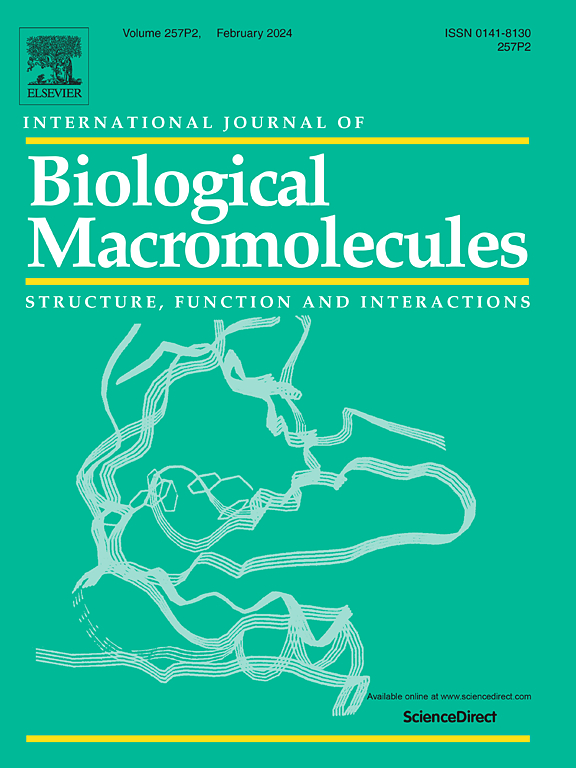Enhanced therapeutic effects of ginseng-derived exosome-like nanoparticles loaded hyaluronic acid injectable hydrogels for breast tumor treatment
IF 7.7
1区 化学
Q1 BIOCHEMISTRY & MOLECULAR BIOLOGY
International Journal of Biological Macromolecules
Pub Date : 2025-04-25
DOI:10.1016/j.ijbiomac.2025.142914
引用次数: 0
Abstract
Ginseng-derived exosome-like nanoparticles (GENs) have been considered as new candidates for tumor therapy. However, maintaining the retention and stability of exosomes in vivo is a major challenge in clinical application of GENs. Here, we prepared hydrogels using modified hyaluronic acid (HA) and carboxymethyl chitosan (CMCS). We investigated whether the combination of GENs with hydrogels could improve the stability of GENs and enhance their retention in tumor tissues, thereby enhancing their tumor therapeutic effect. In vitro experiments showed that hydrogels significantly increased the uptake of GENs by cells and increased tumor apoptosis rate. In vivo experiments showed that hydrogels significantly increased the retention of GENs in tumor tissues and improved the antitumor ability of GENs. Meanwhile, we evaluated the anti-tumor mechanism of GENs. The results showed that GENs and GENs@Hydrogels induced 4T1 cell apoptosis through the PTEN/PI3K/Akt/mTOR pathway and caspase-dependent pathway. In addition, GENs and GENs@Hydrogels down-regulate PD-L1 level in tumor tissues, up-regulate MHC-I level, and increase the abundance of CD8+T cells, which have immune regulation ability. In conclusion, GENs@Hydrogels has been shown to be a successful candidate for the treatment of breast cancer (BC) with its promising potential to modulate immunity and inhibit tumor progression.

参源性外泌体样纳米颗粒负载透明质酸注射水凝胶用于乳腺肿瘤治疗的增强治疗效果
人参衍生的外泌体样纳米颗粒(GENs)被认为是肿瘤治疗的新候选物。然而,维持外泌体在体内的保留和稳定性是GENs临床应用的主要挑战。本研究采用改性透明质酸(HA)和羧甲基壳聚糖(CMCS)制备水凝胶。我们研究了GENs与水凝胶联合使用是否可以提高GENs的稳定性,增强其在肿瘤组织中的滞留,从而提高其治疗肿瘤的效果。体外实验表明,水凝胶可显著增加细胞对GENs的摄取,提高肿瘤细胞凋亡率。体内实验表明,水凝胶显著增加了肿瘤组织中GENs的滞留,提高了GENs的抗肿瘤能力。同时,我们对GENs的抗肿瘤机制进行了评价。结果表明,GENs和GENs@Hydrogels通过PTEN/PI3K/Akt/mTOR通路和caspase依赖通路诱导4T1细胞凋亡。此外,GENs和GENs@Hydrogels下调肿瘤组织中PD-L1水平,上调MHC-I水平,增加具有免疫调节能力的CD8+T细胞的丰度。总之,GENs@Hydrogels已被证明是乳腺癌(BC)治疗的成功候选药物,具有调节免疫和抑制肿瘤进展的良好潜力。
本文章由计算机程序翻译,如有差异,请以英文原文为准。
求助全文
约1分钟内获得全文
求助全文
来源期刊
CiteScore
13.70
自引率
9.80%
发文量
2728
审稿时长
64 days
期刊介绍:
The International Journal of Biological Macromolecules is a well-established international journal dedicated to research on the chemical and biological aspects of natural macromolecules. Focusing on proteins, macromolecular carbohydrates, glycoproteins, proteoglycans, lignins, biological poly-acids, and nucleic acids, the journal presents the latest findings in molecular structure, properties, biological activities, interactions, modifications, and functional properties. Papers must offer new and novel insights, encompassing related model systems, structural conformational studies, theoretical developments, and analytical techniques. Each paper is required to primarily focus on at least one named biological macromolecule, reflected in the title, abstract, and text.

 求助内容:
求助内容: 应助结果提醒方式:
应助结果提醒方式:


